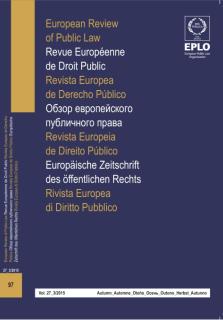
Administrative Law / Droit administratif
2013-2015
IRELAND / IRLANDE
KEVIN COSTELLO
Sutherland School of Law, University College Dublin
The period 2013 to 2015, while relatively quiet in doctrinal terms, has seen developments in the grounds of judicial review. On the law of financial bias the Supreme Court now differs from other common law jurisdictions and has taken a strict view on the question of whether it is acceptable for a decision maker to be a shareholder in one of the parties appearing before it. The right of an individual to correct defective fact-finding is limited to four grounds. The criteria regulating one of those four grounds - the error of fact doctrine - were definitively set out by the High Court in 2013. The Supreme Court has confirmed that the English Carltona rule - that, subject to three exceptions, a power given to a Minister may be exercised by a civil servant of the Minister - operates in Irish law. The right of campaign groups to engage in judicial review has been somewhat restricted by the rule that only organisations which are companies (and not unincorporated associations) may sue. There is internal disagreement within the High Court as to the rules regulating the entitlement of campaign groups to appear as amici curiae.
La période de 2013 à 2015, quoique relativement calme en termes de doctrine, a connu des évolutions sur le terrain du contrôle juridictionnel. Concernant la loi sur le parti pris financier, la Cour suprême se démarque maintenant d'autres juridictions de common law et a donné une interprétation rigoureuse sur la question de savoir si un décideur pouvait être actionnaire de l'une des parties comparaissant devant lui. Le droit d'une personne de corriger des faits établis de manière défectueuse est limité à quatre motifs. Les critères réglementant l'un de ces quatre motifs - l'erreur de fait doctrinale - ont été définitivement fixés par la Haute Cour en 2013. La Cour suprême a confirmé que le principe anglais Carltona - le fait qu'un pouvoir donné à un ministre puisse, à trois exceptions près, être exercé par un employé du ministre - était valable en droit irlandais. Le droit des groupes d'action d'entreprendre un contrôle juridictionnel a été quelque peu restreint par le principe que seules les organisations qui sont des entreprises (et non les associations sans personnalité morale) pouvaient ester en justice. Il existe un désaccord interne au sein de la Haute Cour concernant les principes réglementant le droit des groupes d'action de comparaître comme amici curiae.





















